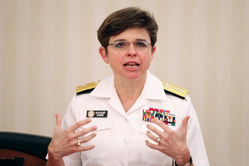As both a pastor and a military service member, a chaplain's life is a balancing act, said Presbyterian Teaching Elder Margaret Kibben, chaplain of the United States Marine Corps and deputy chief of Navy chaplains.
But many people misunderstand the role of a military chaplain – most get asked why they left the ministry, Kibben told Presbyterians Caring for Chaplains and Military Personal Monday at the 221st General Assembly (2014) of the Presbyterian Church (U.S.A.).
Kibben said she discerned a call to chaplaincy after realizing that she wanted to be with her “congregation” every day.
“We as chaplains really have the opportunity to provide … hands-on, intimate ministry,” she said.
As a chaplain, Kibben said her primary role is to help people “understand who they are as spiritual beings.”
Although she is Presbyterian, Kibben serves members of all faiths – and those of no faith – through worship and personal contact.
“We have a responsibility to ensure that our people have a free expression of religion,” she said. “We are here to enable sailors, soldiers and coastguardsmen to be more faithful people.”
Chaplains have the privilege to “eat, sleep and drink” the military life while having access to all levels of command, Kibben said. The fact that everything service members tell them is confidential helps build trust, but they are able to convey a general sense of morale to senior commanders.
“Our little spaces are sanctuaries for those who need them most,” Kibben said. “We can give the director a pulse – a moral, spiritual, ethical pulse – of that command.”
As people of faith, chaplains also have the ability to dialogue with local faith leaders in a conflict. Because many conflicts have a religious element, this unique access is valuable, Kibben said.
While the PC (USA) has supported military chaplains, service members and military families through prayer and love, there is always a need for more help, Kibben said. She suggested that churches in communities with a military presence be proactive and reach out to chaplains with suggestions of specific ways they can volunteer – chaplains are restricted in the ways they can ask churches for help. This is a way for churches to engage in evangelism, Kibben said.
“You have among you people who have invisible wounds. No one goes into combat and comes back unaffected,” Kibben said. “The injuries are moral. This is a role the church needs to play.”

